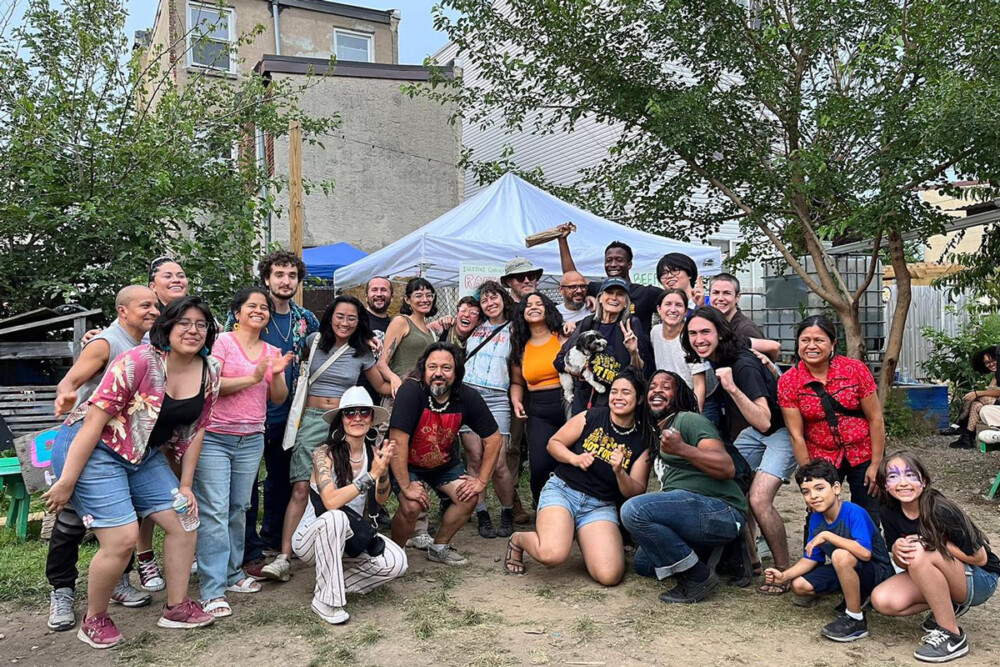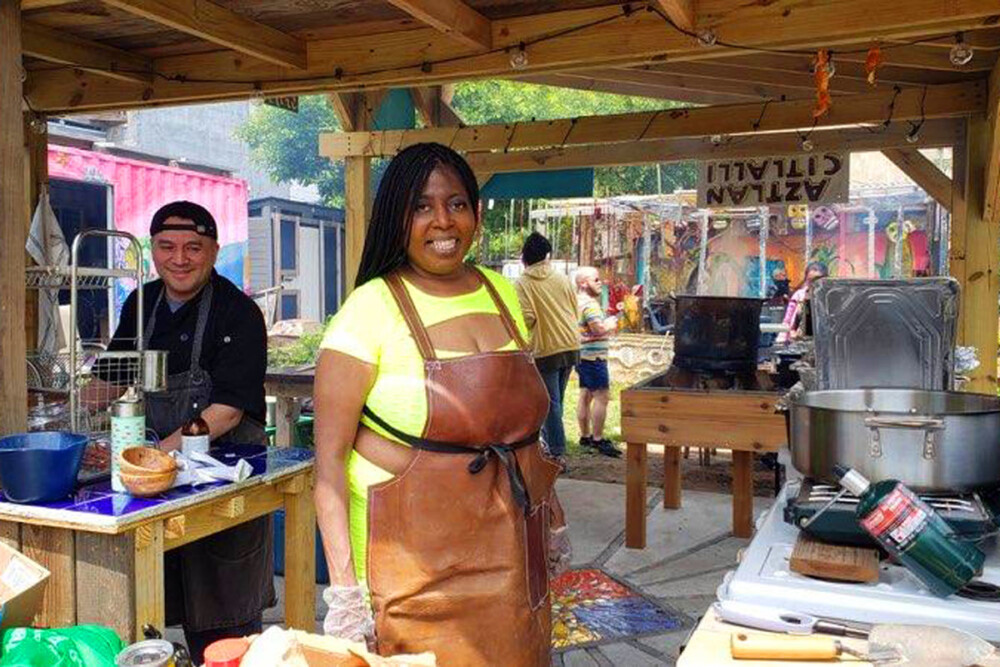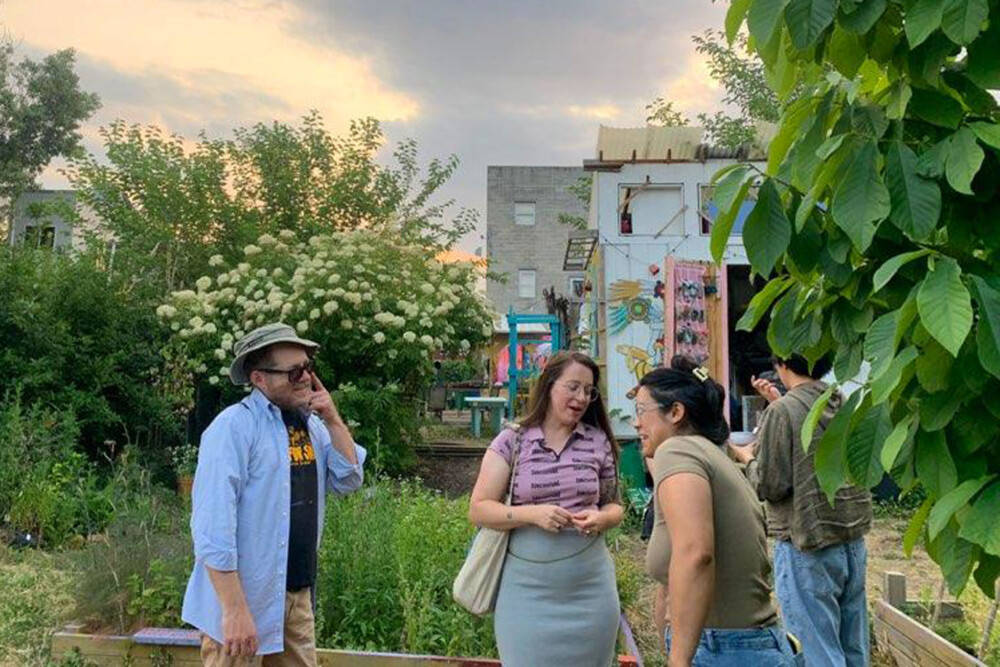
Cesar Andreú Iglesias Community Garden builds social ties. A million-dollar lien buyback can preserve spaces like these.
The city’s investment will help secure the future of 91 abandoned properties that stewards have turned into neighborhood anchors.
Mara Henao remembers feeding corn into a grinder with her grandparents during her childhood in Colombia, part of the process of creating the masa that is central to so many meals across Latin America.
She thought the tradition would be lost when she moved to the United States, but at Cesar Andreú Iglesias Community Garden in Norris Square, she’s been able to grow her own corn to help revive the practice. After a few years spent learning alongside her fellow gardeners how to give the corn the conditions and care it needs to thrive, she now makes masa here in Philadelphia – with her daughter at the crank.
Over the past decade, Henao and a committed group of neighbors have turned a collection of 14 vacant lots near N. 5th Street and Norris Street into a bustling community garden where traditional farming practices and cultural exploration meet. The land has no fence, so anyone can visit whenever they want. Sculptures and art mingle with native plants like the pawpaw tree and crops, including the three sisters- squash, beans and corn- and an open kitchen makes the gardens a space for celebration and communion.
Who owns Philly’s community gardens? Philly just reclaimed 91 of them.

But despite the thousands of hours of work poured into the gardens to make them a place where Henao and her neighbors can explore their traditional roots, the land is not legally theirs and remains subject to a sale that could raze what they have built. In late June, the city announced a deal to help secure the future of two of Iglesias Gardens’ plots and 89 others across Philadelphia by buying back more than $1 million in tax liens from US Bank, the private bank that had held the liens—and therefore the fate of the parcels-since the city sold them in 1997.
“It’s one more step toward being able to secure not just our garden but all the gardens in the city,” Henao said.
The lien buyback means the properties are no longer at risk of being suddenly sent to a sheriff’s sale, releasing them and the communities who tend them from legal purgatory. Although the city doesn’t yet own the 91 plots on which these community gardens have been built, it now has the power to acquire them and transfer their ownership to their stewards, according to Jenny Greenberg, executive director of Neighborhood Gardens Trust, which formed in the 1980s and in the next month will preserve its 52nd community garden. Each garden across the city is unique, but they are united by the risk of being lost to development, she said.
“It’s amazing the amount of work and sweat equity people invest in these gardens,” Greenberg said. “Once they’re preserved, we see people dig in. They can let their guard down and not feel nervous about the future.”
With the weight of uncertainty lifted, community gardens are better able to dream up new programming, implement structures to help them grow into the future, and find funding to amplify the benefits they provide for their neighborhoods, Greenberg said.
“They’re incredible community assets that are providing so many benefits – food access, building social ties and creating opportunities for city residents to have time in nature, and all the environmental benefits that are becoming all the more pressing with climate change,” she said.
For Henao, preserving Iglesias Gardens is a way to push back against the historical inequities that have kept property out of the hands of the Black, brown, and immigrant communities who comprise the majority of garden stewards. Iglesias Gardens is working to secure the future of all 14 of its parcels, some of which are owned by the Philadelphia Land Bank, some of which had US Bank-owned liens on them, and some of which are already private property that couldn’t be rescued in the past.
“To be able to set down roots somewhere is incredible. For me, it means a lot to be able to share things I never thought I’d be able to do again.”
Mara Henao
Henao is part of a group of organizers and advocates who have spent the past few years pushing the city to buy back the US Bank liens. The 91 properties are just a portion of a larger collection of land used for community gardens that she wants to see preserved. And although Iglesias Gardens only had two parcels included in the buyback, Henao and her fellow stewards canvassed through summer and winter, nights and weekends to drum up support for the plan in hopes that they can change the narrative around property in Philadelphia.
“We just have never been able to retain property. As an immigrant, I feel that we get pushed out all the time,” Henao said. “We got pushed out of our country, then we’re here and we keep getting pushed out of places. To be able to set down roots somewhere is incredible. For me, it means a lot to be able to share things I never thought I’d be able to do again.”

Councilmember-at-large Kendra Brooks, who helped push the buyback through City Council, said she was inspired to get involved after community members raised the alarm that some of their lots were going to be sold at sheriff’s sale. Community gardens prevent blight, violence, and food insecurity in Black and brown neighborhoods, offering children a place to play and elders a place to rest in the shade, she said. Although her own garden may not be as vibrant as she’d like right now, a visit to Iglesias Gardens last week to announce the buyback showed Brooks that “my community is in full bloom.”
The recent celebration of Juneteenth reminded Brooks that even the abolition of slavery didn’t mean enslaved people were truly free, as many transitioned into wage slavery, working the same lands for the people who had enslaved them. While the lien buyback is a step in the right direction, she acknowledged that there is a similar need to keep pushing on behalf of community gardens.
“To me, acquiring the liens on those properties means that the land is a little closer to free,” Brooks said. “And I’m committed to working on this project until the land is all the way free.”
What’s next?
The next step is for the Land Bank to receive the funding and support it needs to actualize its vision as an agency that can streamline the use of vacant and abandoned land, Greenberg said. She wants to see the city accelerate its efforts to preserve open spaces like Iglesias Gardens permanently.
“There’s a lot at stake for community gardens,” Greenberg said, “not only the peace of mind that their future is secured but the opportunity to support and grow them so they can thrive as part of the city’s green infrastructure and community infrastructure.”
Cover photo: Facebook








